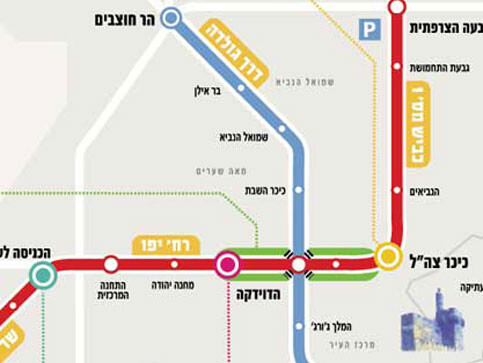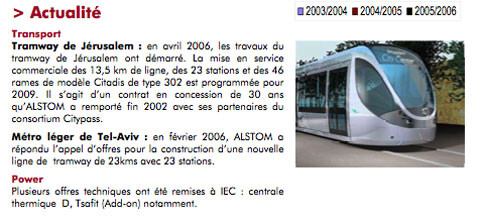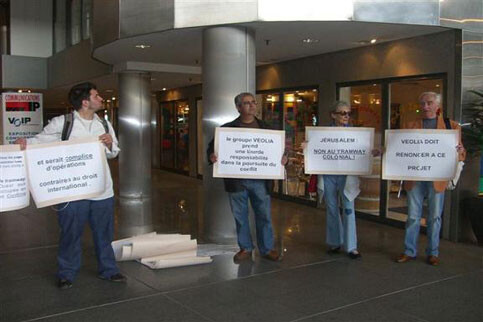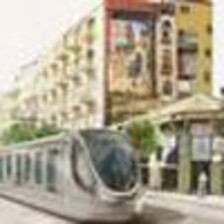The Electronic Intifada 14 March 2007

Last week the Association France Palestine Solidarite (AFPS) has taken legal action in France against Veolia and Alstom because both companies are involved in the Israeli light rail or tramway project that will run on occupied East Jerusalem. The National Collective for Peace [1] gives full support to the legal steps taken by AFPS. Veolia and Alstom have closed their ears to widely voiced criticism that the Israeli tramway project is in violation with international law. Just like Israel the companies act as if they stand above the law. The aim of the action is the annulment of the contracts and to stop the construction activities.
Colonial Israeli tramway
Ten years ago, when Ehud Olmert was mayor of Jerusalem, it was decided that the city needed a network of light rail lines. The project is financed by the private sector and the network will be handed over after 30 years. The CityPass consortium of two French companies Alstom and Connex (Veolia Transport), two Israeli companies and two banks, obtained the concession in 2002. Alstom is responsible for the construction, the production of 23 carriages, the signal system, and the maintenance of the infrastructure for the first line of the network, which will run between Pisgat Ze’ev and Mount Herzl. Veolia Transport has won the 30 years operating rights.

Alstom’s involvement in the tramline. (Alstom/Israel, PDF)
The projected eight lines of the tramway network will link West Jerusalem with the ring of illegal Jewish settlements in the West Bank. In this way the tramway plays a vital role in the expansion of the Israeli colonisation of East Jerusalem. The contract between the Israeli government and CityPass is a violation of the Geneva convention of 1949 that not only prohibits the occupying force to transfer part of its civil population to the occupied territory, but also prohibits the demolition of property unless absolutely necessary for military operations. There can be no doubt about the civilian purpose of the tramway
Contracts contrary to French law
The articles 6, 1131 and 1133 of the French Civil Code state that any agreement can be discharged of its powers when its aim is in contradiction with the public order or good morals. The contracts of Alstom and Veolia Transport are therefore also illegal under French law. The legal action undertaken by AFPS [2] is based on this rule in French law and is seeking the cancellation of the contracts for the construction and running of the tramway in Palestine between Alstom, Veolia and the Israeli government. At the same time the legal action is aimed to prohibit the companies to execute the contract.
Veolia still on the wrong track
Former German Ambassador Joachim Bitterlich, currently Veolia Environment director for international affairs, spoke at a meeting on the role of civil society and the media towards peace in the Middle East during the Annual Strategic Conferences of the Institut de Relations Internationales et Strategiques [3]. The meeting was held on 6 March in Paris and Veolia was presented as one of the major economic actors in the region.

AFPS protest at the annual meeting of Veolia in 2006.
The AFPS participants used the opportunity to ask Bitterlich several questions about the tramway. He dismissed any criticism and stated that all was legal. There is nothing wrong in his view, because the tramway only serves Jerusalem and does not enter into the settlements. It seems that Veolia has a problem understanding international law and completely misses the point that an occupying power is not allowed to change the civil infrastructure in the territories it occupies.
Once again Veolia expressed the myth that members of the Palestinian government were quite happy with the tramway. Actually, the Palestinian Authority has long ago registered its objections to the tramway project in East Jerusalem [4]. President of the Palestinian Authority Mahmoud Abbas shared his objections to Veolia’s partnership in the Israeli tramway with French President Jacques Chirac already in the summer of 2005, as recalled by former Palestinian Minister of Foreign Affairs Ilan Halevy. In November 2006, a delegation of the Palestinian Authority met Ministers and Members of Parliament in France to call for actions against Veolia to stop its involvement in the illegal tramway project.
Veolia’s betrayal of the Palestinian People
Veolia has claimed over and over again that the tramway is also at the benefit of the Palestinian people. It is difficult to link this to the day to day experiences of the Palestinians with the ongoing Israeli colonisation of the occupied territories, such as the construction of the wall, military operations, checkpoints, house demolitions, confiscation of land and properties, and administrative detention. Palestinian civil society is very clear about what they want: boycott, divestment and sanctions against Israel until it complies with international law and universal principles of human rights. [5]
Adri Nieuwhof is a consultant and human rights advocate, Maria Lherm is member of the Association France Palestine Solidarite.
Footnotes
[1] Collectif National pour une paix juste et durable entre Palestiniens et Israeliens (CNP)
[2] Communiqué sur l’action de l’AFPS concernant le tramway en Palestine (5 March 2007)
[3] La France, la communaute internationale et la paix au Proche-Orient, IRIS (Institut de Relations Internationales et Strategiques) 12th annual Strategic Conferences, 6-7 March 2007, Paris.
[5] Principled Dutch ASN Bank ends relations with Veolia, Adri Nieuwhof (26 November 2006)
Related Links





